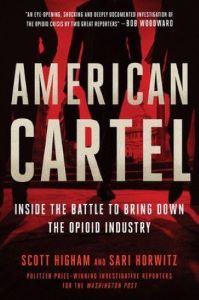A bill legalizing safe injection sites has passed the California legislature and is now on the desk of Gov. Gavin Newsom (D).
This new entry in the growing literature on the opioid crisis digs deep and paints a picture that isn't pretty. But the book's laser-sharp focus on corporate and political malfeasance omits much of the context in which this crisis has unfolded, and that context is important.
Her sentence, if not the circumstances in which she came to face it, is unfortunately par for the course in the regressive Russian criminal justice system.
A small-town Pennsylvania got too friendly with the local drug dealer, a small-town Ohio cop probably wishes he had maintained domestic bliss, and more.
South Dakota's first state-licensed medical marijuana dispensary opens, the FDA is moving toward approval of MDMA-assisted therapy for PTSD, and more.
Marijuana seizures at the US-Mexican border are down again, Colombia's Gulf Clan is escalating its attacks on police as it jockeys for position in upcoming negotations, and more.
Last weekend's Lollapalooza festival in Chicago featured not only music but harm reduction measures, a new poll finds support for federal -- as opposed to state-level -- marijuana legalization, and more.
Louisiana police can no longer search homes based on the odor of marijuana without a warrant, there is good polling for marijuana legalization in Missouri, and more.
The country's largest federal workers' union wants an end to marijuana testing of employees in states where it is legal, Mexican cartel gunmen get in a shoot-out with the Guatemalan president's guards at a border village, and more.
Arkansas election officials knock a marijuana legalization initiative off the ballot -- at least for now -- San Francisco's new DA cracks down on drug dealers, and more.
The nation's most populous state is on the verge of approving safe injection sites in some of its largest cities. A bill that would do just that, Senate Bill 57, narrowly won its final vote in the legislature Monday, and Gov. Gavin Newsom (D) has previously signaled that he was "very open" to the law.

Vancouver's InSite safe injection site. Such facilities could be coming soon to some California cities. (vch.ca)
The bill authored by Sen. Scott Wiener (D-San Francisco) authorizes what it calls "overdose prevention programs" (or safe injection sites) as pilot programs in San Francisco, Oakland, the city of Los Angeles, and Los Angeles County. In each of those jurisdictions, city councils or boards of supervisors have requested inclusion in the bill and will decide whether and how to participate. The pilot program will run for five years, through January 1, 2028.
The legality of safe injection sites under federal law remains unclear. During the Trump administration, the Justice Department strongly opposed them and successfully blocked an effort to open one in Philadelphia, but the Biden administration Justice Department has expressed openness to the harm reduction intervention.
That uncertainty did not stop New York City from opening the first government-approved safe injection sites last November or Rhode Island passing legislation and following suit in March, although the Rhode Island sites are being hobbled by a lack of funding after legislators mandated that no government funds be used to operate them. And that uncertainty has not deterred lawmakers in Sacramento, either.
The California bill overcame extensive pushback, primarily from law enforcement, which argued that the sites failed to provide a strong enough path to drug treatment. Similar objections killed three previous attempts to pass safe injection site legislation by Sen. Susan Eggman (D-Stockton), including a 2018 bill that passed the legislature only to be vetoed by then-Gov. Jerry Brown (D).
It was supported by a broad coalition of organizations including the Drug Policy Alliance, San Francisco AIDS Foundation, California Society of Addiction Medicine, National Harm Reduction Coalition, Healthright 360, Tarzana Treatment Center, and the California Association of Alcohol & Drug Program Executives.
Support for the bill was also heightened by significant increases in drug use and overdoses since the beginning of the coronavirus pandemic. San Francisco saw a record number of overdose deaths in 2020, with 711 deaths total. In 2021, 640 people died of overdoses, and the city is on track to exceed that number this year. Statewide, approximately 10,000 people died of drug overdoses from April 2020 to April 2021.
"California -- like our nation as a whole -- is experiencing a dramatic and preventable increase in overdose deaths, and we need every available tool to help people stay alive and get healthy," said Senator Wiener after the final vote. "Safe consumption sites are a proven model to help people avoid overdose deaths, reduce HIV and hepatitis transmission, reduce syringe litter, and help people access treatment. This legislation isn't about whether we want people to use drugs. Rather, it's an acknowledgment that people *are* using drugs, and our choice is whether we want to make every effort to help them survive and get healthy. The time has come for California to adopt this proven overdose death prevention strategy."
Safe injection sites have been operating for decades in Europe, Canada, and Australia and have a proven safety track record. At the 170 safe injection sites that have operated around the world, not a single overdose death has been reported. In New York City, in the first three months of operation, staff at these sites were able to halt over 150 overdoses.
Safe injection sites are a proven harm reduction intervention that saves lives without increasing crime or disorder. The Biden administration does not appear to be inclined to claim they violate federal law and has made no move against the sites operating in New York and Rhode Island. It appears the path is open. All Gov. Newsom has to do is pick up his pen and sign the bill.
back to top
American Cartel: Inside the Battle to Bring Down the Opioid Industry, by Scott Higham and Sari Horwitz (2022, Twelve Press, 400 pp., $30.00 HB)
Phillip S. Smith, with contributions from David Borden
Pulitzer Prize-winning Washington Post investigative reporters Scott Higham and Sari Horwitz have been on the opioid beat for years, teaming up (with others) on the Post's "
The Opioid Files" series, which was nominated for a Pulitzer in 2020. Now, with
American Cartel, the pair provide a deeply-sourced account of how opioid manufacturers, distributors, and pharmacies waged an all-out campaign to fend off DEA efforts to stanch the flow of billions of opioid pain pills, and to evade any culpability, even as the overdose death toll mounted year by year.
The picture Higham and Horwitz paint of corporate and political malfeasance is damning. But the laser sharp focus with which they paint it, omits much of the context in which the opioid crisis has unfolded. And that context is also very important.
An article in yesterday's Guardian shows one of the reasons why. In much of the world, very few pain patients are able to access opioids at all. Much suffering results, sometimes leading to suicide attempts. Dr. MR Rajagopal, chair of Pallium India, told the Guardian, "Pain is not visible. It happens in hospital beds or patients' rooms and is not visible to the world. Addiction, on the other hand, is very visible in headlines which quote the US epidemic and overdose deaths. No one talks about the western European success over decades; all the news is about the opioid crisis in the USA. This means that when we try to have discussions, our work becomes harder because many minds are primed against opioids."
In other words, by speaking too solely to one side of an issue, one risks adversely impacting the other sides. Whether "opiophobia" is real or significant in the US is another question. Higham and Horwitz don't venture a view on this, at least not in American Cartel.
One entity that has warned about opiophobia (without using the term) is the US Centers for Disease Control. In a 2019 memo, CDC writes that a 2016 guidance the agency issued on prescribing opioids for chronic pain had seen "misapplication[s]" by some physicians that put patients at risk. The memo cites a New England Journal of Medicine commentary by the authors of the 2016 guidance. It warns against "hard limits" on opioid dosages or cutting patients off; abrupt tapering of prescriptions; applying the guidance to acute pain situations patients face in situations like active treatment for cancer or sickle cell anemia or post-operative care; and applying it to medication-assisted treatment prescriptions for addiction.
Technically the CDC memo addressed a period of a few years beginning in 2016. But the dynamics it describes are inherent risks in a situation where providers are charged with supplying a substance that's useful but also addictive and potentially deadly if misused, and for which they can be sanctioned professionally or even prosecuted and imprisoned if things go wrong or someone disagrees. Pharma-driven promotion of their new opioid products was a factor in driving up prescribing rates to where they reached. But a part of the increase was also the medical community reacting to a real problem of under-treatment or non-treatment of pain for some patients, a problem that coexists with over-prescribing to some other patients. That increase in turn came with a learning curve.
The authors also give short shrift to the impact of today's woes and inequalities in driving the so-called deaths of despair -- a concept coined by Princeton professors Anne Case and Angus Deaton -- alienation and anomie, helplessness and hopelessness afflicting many Americans who have been left behind in the modern economy, especially in the opioid use heartlands of the Midwest and Appalachia. The Midwest deindustrialized beginning in the 1970s, and both regions largely missed out on the tech boom of the '90s and '00s. Then came even more pain with the Great Recession, followed by COVID and more economic and social disruption. People there (and elsewhere) are dying not just of opioids, but of smoking, drinking, and suicide. Big Pharma is easily (and oh so deservingly) demonized, but the laser focus on the companies allows us not to have to look in the mirror about the pain our society produces.
That factors like these should play a role in the opioid crisis, though, doesn't exonerate Big Pharma. Rather, the misleading promotions of their products carried out by pharma, took an even greater toll due to the vulnerabilities those other factors had brought to the fore.
Meanwhile, the death toll continues to mount -- over 100,000 per year, and with a new record high every year. Prescription opioids still figure prominently in overdoses. But the greatest part of the problem by far is black-market fentanyl, used deliberately by some high tolerance heavy users of opioids, but primariy causing overdose as an adulterant in heroin, counterfeit prescription pills, and other street drugs, essentially a poisoning crisis. But as Higham and Horwitz note, that is part of a wave of opioid use that began with pharmaceutical companies such as Purdue Pharma taking Oxycontin onto the market in the late 1990s. The first decade of this century also saw other prescription opioids -- oxycodone, hydrocodone, Vicodin, Percocet, Opana, et al. -- hit the market.
Higham and Horwitz are fond of tossing around astounding numbers of pills produced by manufacturers or sold by certain pharmacies, such as Mallinckrodt producing 3.5 billion 30 milligram hydrocodone pills in one year, and critics could protest that those numbers need context, too. A prescription for a medication doesn't just have a number of pills to take. It specifies how large a dosage there is inside each pill. A smaller number of pills that each contain a higher dose might mean more than a larger number that each contain a smaller dose. And a higher dose prescription sometimes reflects a patient's tolerance to opioids built up through past medical (or non-medical) use. Maybe West Virginia didn't really need 81 million pain pills during a five-year span. But maybe it did. Without more information, it's just not clear what these numbers mean.
They do provide some context, though, for example by comparing pain pill sales across all drug stores in a region and pointing out anomalies not easily explainable by, say, differing rates of cancer or other serious illness. And they demonstrate that plenty of businesses -- from Big Pharma to the drug store chains and individual pharmacies -- were either in it for the money or at best screwed up, both through detailed analysis and telling anecdote. For example, there was the guileless Florida pharmacist who explains to investigators that she fills pain pill prescriptions all day long, but always keeps a certain number of pills on reserve "for my real pain patients."
When the DEA cracked down first on Wild West internet sales of opioids and then on the "pill mills," medical practices with perfunctory examinations and huge numbers of opioid prescriptions whose entire business model seemed to be writing opioid prescriptions, it succeeded in reducing access to those drugs. But the people using opioids didn't stop; they went to black market drugs, fueling first a resurgence in heroin use and now an opioid crisis driven by fentanyl.
A key figure in the tale is Joe Rannazzisi, who as head of DEA's Office of Diversion Control from 2006 to 2015 oversaw the agency's endless effort to ensure that prescribed opioids are only prescribed for legitimate medical purposes and not leaking into the black market. We are inclined to think of the DEA as a prohibitionist agency, but in this case, it is acting as a regulatory agency. And what Higham and Horwitz uncover is a case of regulatory capture -- when the industry being regulated manages to set the terms under which it is regulated, for its own benefit, not that of the public.
Rannazzisi and his team of DEA lawyers spent years going after opioid manufacturers, distributors, and pharmacy chains who were repeatedly (administratively) busted for failing to do due diligence about just who was buying their products. The companies would pay huge fines, promise not to do it again, and then continue to pump massive amounts of opioids through the supply chain.
The companies mobilized against Rannazzissi and his campaign, forming industry front groups, undertaking lobbying efforts, hiring legions of high-priced law firms, and crafting legislation that would rein in what they saw as an out-of-control agency. As Higham and Horwitz document in great detail, it worked.
Sponsored by Rep. Tom Marino (R-PA) and Sen. Marsha Blackburn (R-TN), both of whom received substantial contributions from the industry, but written by industry lobbyists, the nicely named Ensuring Patient Access and Effective Drug Enforcement Act removed from the DEA tools that Ranizzisi had been using to try to force drug distributors to monitor and report suspicious orders, such as the 1.2 million oxycodone tablets one distributor bought from Mallinckrodt in one day, only to order another 1.2 million the next day.
The bill passed, only to be drastically revised amidst scandal after an earlier Post report on the opioid bill derailed then-President Trump's effort to name Marino drug czar. But Higham and Horwitz also detail rot inside the DEA, where the industry managed to get to high-ranking officials who sidelined Rannazzisi, forcing him into retirement and forcing many of his team members into bureaucratic Siberia. It's an ugly little story of money and power, the sort that is all too common in Washington.
If the first part of American Cartel reads like a detective novel, the second part is more like a legal thriller, It covers the massive wave of civil lawsuits filed against the drug companies, and it is not particularly edifying reading. You see hundreds of high-powered attorneys from the country's top litigating firms -- including dozens of former DEA attorneys working now working for the industry they regulated -- facing off against armies of lawyers for the thousands of states, cities, and counties. You see massive settlements from the companies and massive damages wrested from companies that went to court and lost. While it is unclear just how the moneys won or negotiated by the various plaintiffs is actually being used to help people who suffered from the opioid crisis, what is clear is that it has been a bonanza for the legal profession, with winnings -- excuse me, earnings -- by attorneys reaching well over a billion dollars.
They weren't all in it for the money, though. Some, like West Virginia attorney Paul Farrell, whose state was one of the epicenters of the pain pill epidemic, were sickened by the toll of addiction they saw all around them. Not willing to settle for the pittance the town and county he represented would receive under a massive settlement agreed to by most of the suing entities, he gambled on going it alone against the drug distributors. As this book went to print in April, he was still waiting for a decision. Earlier this month, he lost, with a federal judge ruling that drug distributors were not responsible for the area's opioid crisis.
The litigation goes on, and the dying goes on. Sometimes the drug companies settle, sometimes they lose and have to pay even more. But sometimes they win.
The profit-driven wave of opioids that engulfed the country in the last couple of decades is not an anomaly. The pharmaceutical companies have a historical pattern of creating and marketing drugs that later wreak havoc. That's what they did with amphetamines, that's what they did with barbiturates, that's what they did with benzodiazepines. It's almost enough to make one wonder if profit-driven capitalist enterprises should be in charge of the nation's drug supply.
Read Higham and Horwitz's book. But read Case and Deaton's too. And when you see the next "pill mill" story, don't assume that it is, or isn't, what it seems.
back to top
A Russian judge sentenced American basketball star Brittney Griner Thursday to nine years in a Russian penal colony after earlier being found of bringing cannabis oil into the country in her luggage. The guilty verdict was virtually a foregone conclusion in a criminal justice system that wins convictions in 99 percent of cases.

This is what got Brittney Griner a nine year sentence.
Russian authorities detained Griner, a two-time Olympic gold medalist and Women's National Basketball Association (WNBA) star, just a week before Russia invaded Ukraine, and she is widely viewed as having become a pawn in the conflict between Washington and Moscow over the war. Griner's attorneys say they will appeal the verdict.
President Biden, who has been under pressure to win her release from her wife and the athletic community and whose administration is attempting to negotiate a prisoner swap for Griner, called her sentence "unacceptable," and vowed to continue to make every effort to free her.
The US has offered a prisoner swap of Griner and another imprisoned American, Paul Whelan, in return for Russian arms dealer Victor Bout, who is currently serving a 25-year sentence in the US for conspiring to sell arms to Colombia's leftist rebels, the FARC. But the Russians have so far demurred, first saying that Griner's trial had to finish and, more recently, showing littler interest in the matter.
While Griner's sentence seems stiff to Western sensibilities, it is in line with Russia's draconian, zero-tolerance drug laws. Drug offenders make up a quarter of the country's prison population. As Penn State University law professor William Butler noted: "To many in the US, nine years' imprisonment may seem like a harsh penalty for cannabis possession. But in Russia, it is par for the course for this crime."
Another American citizen, 61-year old Marc Fogel, is currently serving a 14-year sentence in Russia for marijuana possession. Fogel and his wife were returning to Russia for the last year of a ten year teaching stint, when he was caught. According to family, Fogel uses marijuana to treat chronic back pain.
back to top
A small-town Pennsylvania got too friendly with the local drug dealer, a small-town Ohio cop probably wishes he had maintained domestic bliss, and more.

pile-of-cash_180_250.jpg
In Dickson City, Pennsylvania, a Dickson City police office was arrested last Thursday for revealing a confidential informant's identity to a drug dealer. Patrolman Brandon Muta, 23, drew suspicions when he grew angry upon learning that another officer's informant had identified a certain man as a meth dealer. Muta told a detective that the dealer sometimes supplied him with information. Days later, that informant reported that the dealer had refused to sell her drugs and called her a "snitch," When interviewed later by the detective, the dealer had revealed the informant's name to him. The dealer also confirmed that he had snitched on other dealers for Muta and that Muta had revealed the identities of other informants. It's not clear what the exact charges against Muta are.
In LaGrange, Georgia, a Troup County Sheriff’s Office detention officer was arrested Tuesday after he got caught bringing drugs into the jail for money. Officer Steven Michael Crowder, 23, went down after allegations were made that he was bringing drugs in for inmates and being paid by a third party. An investigation ensued, and his arrest was the result. He faces four counts of violation of oath by a public officer, four counts of items prohibited for possession by inmates, and one count of conspiracy to distribute methamphetamine
back to top
South Dakota's first state-licensed medical marijuana dispensary opens, the FDA is moving toward approval of MDMA-assisted therapy for PTSD, and more.

Psilocybin mushrooms. Legalizing them could be on the ballot in Medford, Oregon, this November. (Pixabay)
Missouri Marijuana Legalization Initiative Campaign Needs More Signatures as Deadline Looms. Legal Missouri, the group behind an initiative to legalize marijuana in the state, handed in more than twice the number of signatures needed to qualify for the November election, but may still come up short because of the state's requirement that it meet signature thresholds in each of the state's congressional districts. The group is 1,144 signatures short in the 7th Congressional District and 1,573 short in the 6th. The campaign says it is double-checking signature counts from local election authorities in hopes of making up the shortfall. Secretary of State John Ashcroft (R) will announce by August 9 whether or not the campaign has qualified.
Medical Marijuana
South Dakota's First State-Licensed Medical Marijuana Dispensary Opens. The Unity Road Dispensary in the small town of Hartford opened its doors for business Wednesday, becoming the first state-licensed dispensary to open after voters approved a medical marijuana initiative in 2020. But it is not the first dispensary in the state: The Flandreau Santee Sioux Tribe opened Native Nations Cannabis in July 2021, saying it did not need to wait for the state to license it because it is on sovereign Native American territory. Another has since opened on the Pine Ridge reservation.
Psychedelics
Biden Administration Preparing for FDA Approval of MDMA-Assisted Therapy for PTSD. The Department of Health and Human Services released a letter Wednesday that described the Food and Drug Administration's "anticipated approval… within approximately 24 months" of psychedelic-assisted therapies. The letter said that the Substance Abuse and Mental Health Services Administration is exploring establishment of a Federal Task Force to address the complex issues associated with the commercialization of psychedelic medicines, including clinical, regulatory, and public policy matters.
The Multidisciplinary Association for Psychedelic Studies (MAPS), which has pioneered clinical trials on MDMA, was pleased: "We applaud the Biden Administration for taking psychedelic-assisted therapies, and their potential to treat life-threatening mental health conditions, seriously. A Federal Task Force on psychedelic-assisted therapies should take a multidisciplinary approach to ensuring that red tape, administrative delays, or insurance coverage questions don't leave Americans suffering as they seek to access approved treatments," said MAPS founder and executive director Rick Doblin.
Doblin continued, "For the first time, research that has been driven by philanthropists could additionally be supported by the same types of Federal grants that have funded other health care revolutions and develop patient access strategies that prioritize public benefit over profit. For decades, we have been making the case for what the Administration is now acknowledging: psychedelic-assisted therapies may become a key in addressing the most urgent mental health challenges of our time and reducing needless suffering."
Medford, Oregon, City Council Ponders Psilocybin Legalization. In a surprise move, the city council has scheduled a study session about psilocybin for tonight's meeting. No vote on an ordinance is expected, but the city council said it wants the study session to make an informed decision about putting an ordinance on the November ballot.
back to top
Marijuana seizures at the US-Mexican border are down again, Colombia's Gulf Clan is escalating its attacks on police as it jockeys for position in upcoming negotations, and more.

San Francisco could become the largest US city to decriminalize psychedelics. (Creative Commons)
Feds Report Significant Year-Over-Year Decline in Marijuana Seizures at the US Border. The amount of marijuana seized at the US-Mexico border has dropped dramatically this fiscal year, with seizures averaging 408 pounds a day, down from an average of 874 pounds a day during FY 2021, according to the Department of Homeland Security. Other drug seizures at the border are up, but the decline in marijuana seizures is part of a consistent downward trend in recent year. As the DEA has noted, "In US markets, Mexican marijuana has largely been supplanted by domestic-produced marijuana."
Arkansas Marijuana Legalization Initiative Set to Qualify for Ballot. State officials have confirmed that a marijuana legalization initiative from Responsible Growth Arkansas has submitted enough valid voter signatures to qualify for the November ballot. But the state Board of Election Commissioners must first approve the popular name and ballot title of the measure. It would legalize the possession of up to an ounce by people 21 and over, but not home cultivation. It would also set up a system of taxed and regulated marijuana commerce.
Psychedelics
San Francisco Psychedelic Decriminalization Resolution Filed. Supervisors Dean Preston (D) and Hillary Ronen (D) have filed a resolution to decriminalize psychedelics such as psilocybin and ayahuasca. The resolution also calls for broader statewide reform. If the resolution is passed, San Francisco would be the most populous city in the country to decriminalize psychedelics.
International
Colombia's Gulf Clan Trafficking Group Stepping Up Attacks on Police. The Gulf Clan, the country's most powerful drug trafficking organization, is stepping up a campaign of violence against police that began in May, when its leader, Dario Antonio Usuga, known as "Otoniel," was extradited to the United States to face trafficking charges. But now, as the country approaches the transfer of power from conservative President Ivan Duque to leftist former guerrilla Gustavo Petro, is ratcheting up the violence, apparently in a bid to bolster its prospects in potential negotiations with the new government. At least 25 police officers have been killed by the Gulf Clan, 12 of them in the last month, and three in just the past week.
UN Experts Call for Immediate Moratorium on Singapore Executions for Drug Offenses. UN experts have condemned the execution of Nazeri Bin Lajim, a 64-year-old Malay Singaporean national convicted of drug offenses and urged the Government of Singapore to halt plans to execute individuals on death row for drug-related charges. There has been a sharp rise in execution notices issued in Singapore this year.
Nazeri Bin Lajim was arrested in April 2012 and convicted for trafficking 33.39 grams of diamorphine under the 1973 Misuse of Drugs Act in September 2019. The mandatory death penalty was subsequently imposed in his case and enforced on 22 July 2022. "Under international law, States that have not yet abolished the death penalty may only impose it for the 'most serious crimes', involving intentional killing," the experts said. "Drug offences clearly do not meet this threshold."
The experts reiterated that, as per the Working Group on Arbitrary Detention's report on arbitrary detention relating to drug policies andits subsequent jurisprudence, imposing the death penalty for drug-related offenses is incompatible with international standards on the use of the death penalty.
back to top
Last weekend's Lollapalooza festival in Chicago featured not only music but harm reduction measures, a new poll finds support for federal -- as opposed to state-level -- marijuana legalization, and more.

Chicago officials handed out Narcan and fentanyl test strips at last weekend's Lollapalooza festival. (Creative Commons)
Bipartisan Federal Marijuana Expungement Bill Filed. Reps. Troy A. Carter, Sr. (D-LA) and Rodney Davis (R-IL) filed a bill last Friday that would pave the way for federal misdemeanor marijuana offenses to be expunged. The bill is the Marijuana Misdemeanor Expungement Act. "These misdemeanors -- even without a conviction -- can result in restrictions to peoples' ability to access educational aid, housing assistance, occupational licensing and even foster parenting," said Carter. "Delivering justice for our citizens who have been impacted by marijuana-related misdemeanors is a key component of comprehensive cannabis reform."
Americans Favor Federal Marijuana Legalization Mandate in Polling. Support for marijuana legalization remains high, but a new poll from The Economist and YouGov.com shows an increasing number of people want legalization to come from the federal government. Some 45 percent said the federal government should legalize it, while another 21 percent said legalization should primarily be left up to the states. Between them, that's two-thirds support for some form of freeing the weed. Only 20 percent thought "marijuana should be banned nationally."
Psychedelics
Poll Finds Majority Support Psychedelic Research for Military Members. A new poll from YouGov.com finds that 54 percent of respondents said they support "allowing research into the therapeutic potential of certain psychedelic substances for active-duty military members with post-traumatic stress disorder (PTSD)." Support was strongest among Democrats (60 percent), followed by independents (54 percent) and Republicans (45 percent). Reps. Alexandria Ocasio-Cortez (D-NY) and Dan Crenshaw (R-TX) both sponsored psychedelic research amendments that made it into the 2023 Fiscal Year National Defense Authorization Act (NDAA), which passed the House earlier this month.
Opioids
City of Chicago Warned Lollapalooza Festivalgoers About Fentanyl. The city's Department of Public Health last Friday issued an alert on its social media accounts warning fans of the massive Lollapalooza music festival that ended Sunday that fentanyl can easily cause an overdose and that they should take steps to know what is in their drugs. The city cautioned that fentanyl is being found not only in heroin, but also non-opioid drugs such as meth, Ecstasy, and cocaine. "Every year, we see young people end up admitted to the hospital because they've experimented -- at a time when we really want people to have fun, but have fun safely," said Public Health Commissioner Dr. Allison Arwady.
back to top
Louisiana police can no longer search homes based on the odor of marijuana without a warrant, there is good polling for marijuana legalization in Missouri, and more.

The Vancouver safe injection site. California cities could soon follow suit. (vch.ca)
Louisiana Cops Can No Longer Use Marijuana Odor as Excuse to Search Homes. As of Monday, police in the state are prohibited from searching people's residences based on the odor of marijuana unless they have a warrant. That is because the legislature this year passed and the governor signed into law Act 473, which mandates that: "Notwithstanding any provision of law to the contrary, the odor of marijuana alone shall not provide a law enforcement officer with probable cause to conduct a search without a warrant of a person's place of residence." Another new law, this one banning vaping or smoking marijuana in a vehicle, also went into effect Monday.
Missouri Poll Shows Strong Support for Marijuana Legalization. A new SurveyUSA poll of registered voters has support for marijuana legalization at 62 percent, including majorities of every demographic group except those over 65 and Republicans. While GOP voters did not show majority support, more Republicans supported legalization (47 percent) than opposed it (40 percent). The poll comes as marijuana legalization initiative awaits a decision a week from today on whether it has turned in enough valid voter signatures to qualify for the November ballot.
Opioids
West Virginia Cities and Counties Settle with Drug Firms Over Opioid Crisis. A group of cities and counties that sued drug distribution firms, accusing them of fueling a deadly wave of opioid use, have settled with three distributors for $400 million. The companies, AmerisourceBergen, Cardinal Health, and McKesson, were facing imminent trial in state court when they settled. Last month, a federal judge ruled against Cabell County and Huntington in similar claims. They are not included in the settlement announced Monday and plan to appeal the ruling that rejected most arguments made against the drug companies.
Harm Reduction
California Safe Injection Site Bill Heads to Governor's Desk. A bill that would allow four safe injection site pilot programs to get underway is now on the desk of Gov. Gavin Newsom (D). Sponsored by Sen. Scott Wiener (D-San Francisco), Senate Bill 57 got final approval in the Senate Monday. It had already passed the Senate earlier, but was amended in the House, necessitating a final concurrence vote. Under the bill, Los Angeles, Los Angeles County, Oakland, and San Francisco could open harm reduction centers as pilot programs lasting through January 1, 2028. "We're seeing an escalation in overdose deaths," Wiener said after Monday's vote. "These sites are a proven strategy to save lives and get folks into treatment. It's time." A similar bill passed in 2018, only to be vetoed by then-Gov. Jerry Brown (D). If Gov. Newsom signs the bill, California would follow Rhode Island as states that have okayed safe injection sites. A municipal safe injection site program is currently underway in New York City.
back to top
The country's largest federal workers' union wants an end to marijuana testing of employees in states where it is legal, Mexican cartel gunmen get in a shootout with the Guatemalan president's guards at a border village, and more.

An Amsterdam cannabis "coffee shop." More shops like this are coming to California. (Creative Commons)
Largest Federal Workers' Union Calls for Ending Marijuana Testing for Most Government Employees in Legal States. The American Federation of Government Employees (AFGE), the nation's largest union representing federal workers, adopted a resolution earlier this summer supporting marijuana legalization and calling for an end to marijuana testing and other policies that penalize marijuana-using employees in states where it is legal. Only the title of the resolution, "Resolution to Support Deleting Responsible Off-Duty Marijuana Usage from Suitability Criteria," has been posted, not its actual text. But a draft version of the text included support for marijuana legalization and urged the US Office of Personnel Management to "rescind its policies regarding pre-employment use and off-duty use of cannabis by federal employees in non- safety-sensitive, non-national security positions to the extent such cannabis use is permitted by state or District of Columbia law." The AFGE represents more than 700,000 federal workers.
California Marijuana Consumption Lounges Set to Take Off. After a slow start because of pandemic shutdowns and local concerns, marijuana consumption lounges appear set to expand across the state. Most lounges in the state are currently centered in the San Francisco Bay area (there is only one in the Los Angeles area, in West Hollywood), but now lounges are getting the go-ahead from municipalities in Southern California and the Central Valley. That means the number of lounges in the state could double from the current dozen or so. Right now, new lounges are approved to open in Fresno, Riverside, San Diego, and Ventura counties, with more in the pipeline.
International
Bolivia Coca Growers Clash with Police in La Paz. Fighting broke out in the capital city of La Paz between hundreds of coca growers from the Association of Coca Producers (Adepcoca) joined by other opponents of leftist President Luis Arce and the police. The clashes are over the commercialization of coca and who will benefit from it. Adepcoca is facing off against pro-government coca growers over who will control the Adepcoca market, through which 90 percent of the country's legal coca crop passes. They accuse the pro-government growers of running a parallel market. The same conflict led to violence clashes in La Paz last year, too. Tuesday's clashes feature coca growers throwing firecrackers and dynamite caps with responding with volleys of tear gas. "We are asking that this alleged market for the sale of coca, which has nothing to do with the legal market of Adepcoca, be closed immediately," said protest leader Carlos Choque. "We will not be afraid if they want to 'shoot' us, we are here." Protest leaders said the protests would continue until the parallel market is closed.
Mexico Drug Cartel Attacks Guatemalan Presidential Convoy. Gunmen from the Jalisco New Generation Cartel launched an attack Saturday on a Guatemalan presidential convoy at the village of La Laguna on the Guatemala-Mexico border Saturday. President Alejandro Giammattei was reportedly not involved in the incident. The presidential guard had been traveling around the village when it spotted armed gunmen approaching. The soldiers told the gunmen to back off, but they instead opened fire. One local cartel leader was wounded and subsequently arrested with the rest of the gunmen fleeing into Mexico, where Mexican authorities arrested four Guatemalan nationals. The JNGC operates extensively in Guatemala.
back to top
Arkansas election officials knock a marijuana legalization initiative off the ballot -- at least for now -- San Francisco's new DA cracks down on drug dealers, and more.

Kentucky did not do it, but maybe the federal government can obtain justice for Breonna Taylor.
Arkansas Panel Rejects Marijuana Legalization Initiative. The state Board of Election Commissioners on Wednesday blocked a marijuana legalization initiative from Responsible Growth Arkansas from appearing on the ballot in November. The board rejected the popular name and ballot title for the measure, which has already accumulated enough voter signatures to qualify for the ballot. Responsible Growth Arkansas says it will appeal to the state Supreme Court. The board said it rejected the measure because members believed the ballot title didn't fully explain the measure's impact, but Responsible Growth Arkansas said the amount of detail demanded would make the ballot title "thousands and thousands of words long."
Law Enforcement
Feds Charge Four Louisville Cops in Breonna Taylor Case. The FBI has charged four Louisville police officers for their actions leading up to and during a March 2020 drug raid on the apartment of medical worker Breonna Taylor, who was killed by police gunfire after her boyfriend shot at what he believed to be intruders trying to break into the residence. Those charged include former Louisville Metro Police Department (LMPD) officers Joshua Jaynes, Brett Hankison, and Kelly Hanna Goodlett, as well as current LMPD sergeant Kyle Meany was also arrested Thursday by the feds. The feds are charging the four with civil rights violations, which include charges of obstruction of justice for actions they took after the raid. The four officers largely escaped justice at the state level, with only one charged, and later acquitted -- not for shooting Taylor but for endangering the lives of neighbors by wildly shooting several rounds into the building. The killing of Taylor became a major rallying cry in the summer of protests sparked by the killing of George Floyd by Minneapolis police.
San Francisco DA Cracks Down on Drug Dealers. Newly-elected District Attorney Brooke Jenkins on Wednesday announced tougher new policies to hold drug dealers accountable, saying anyone caught with more than five grams of drugs would no longer be referred to the city's drug court, that she will make use of sentencing enhancements for drug dealing within a thousand feet of a school, and will seek pretrial detention of fentanyl dealers in "extreme" cases. The move comes as Jenkins replaces former progressive prosecutor Chesa Boudin, who was recalled amidst rising public concern over crime and squalor in the city. But the city's Public Defender called Jenkin's approach "regressive," saying it will disproportionately affect communities of color. "If District Attorney Jenkins truly wants to address the issues facing our city, she should not be relying on outdated and politically expedient soundbites about harsher enforcement," said Public Defender Mano Raju.
International
Brittney Griner Sentenced to 9 Years in Russian Penal Colony for Possessing Small Quantity of Cannabis Oil. American basketball star Brittney Griner was sentenced Thursday to nine years in a Russian penal colony after earlier being found of bringing cannabis oil into the country in her luggage. The guilty verdict was virtually a foregone conclusion in a criminal justice system that wins convictions in 99 percent of cases. Griner was detained by Russian authorities just a week before it invaded Ukraine, and her case is widely seen as part of the broader conflict between Russia and the United States over that conflict. Griner's attorneys say they will appeal the verdict. President Biden, who has been under pressure to win her release from her wife and the athletic community and whose administration is attempting to negotiate a prisoner swap for Griner, called her sentence "unacceptable," and vowed to continue all-out efforts to get her home.
Cannabis Cafes Emerge in Thailand. "Several" cannabis cafes have opened in Bangkok since the country decriminalized cannabis in June, despite the government's warning that the law's relaxation did not include recreational marijuana use. Recreational use has exploded under the new law, something that government officials have tried to discourage. Now, a parliamentary committee is working on a bill that could rejigger the rules and possibly impact the cannabis cafes. In the meantime, one café owner said his place had "hundreds" of customers every day. "Europeans, Japanese, Americans -- they are looking for Thai sativa. Cannabis and tourism are a match," he said.
back to top









